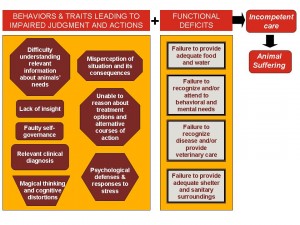Animal hoarding is a psychological disorder resulting in the pathological accumulation of animals, and it is particularly disturbing, compared to hoarding of inanimate objects, because innocent animals become suffering, long-term, and often fatal victims of neglect. Worse, animal hoarders rarely recognize the harm and cruelty being inflicted on the animals they have collected. Because it is defined as animal abuse, animal hoarding is also a crime.
Animal hoarding is defined by the Cummings School of Veterinary Medicine at Tufts University, with the following criteria:
- Having more than the typical number of companion animals.
- Failing to provide even minimal standards of nutrition, sanitation, shelter, and veterinary care, with this neglect often resulting in illness and death from starvation, spread of infectious disease, and untreated injury or medical condition.
- Denial of the inability to provide this minimum care and the impact of that failure on the animals, the household, and human occupants of the dwelling.
- Persistence, despite this failure, in accumulating and controlling animals.
The psychological disorder can affect anyone, with any economic, professional, or cultural background, and is now believed to be an accumulation of several varying types of mental, physical and environmental factors.
Animal hoarding is frequently noticeable by neighbors and community members. Here are some resources where you can report suspected cases of animal neglect, cruelty and hoarding:
Kern County
Kern County Animal Services: (661) 868-7100
Los Angeles County
Animal Cruelty Task Force: (213) 486-0450
Orange County
Animal Care Services at (714) 935-6848
Riverside County
Riverside County Animal Services: (951) 358-7387
San Bernardino County
San Bernardino Animal Cruelty Task Force: 1-800-78-CRIME
San Luis Obispo County
SLO County Animal Services: (805)781-4407
Santa Barbara County
Santa Barbara Humane Society:(805) 964-4777, ext. 18
Ventura County
Humane Society of Ventura County: 805-646-6505
Call Bio SoCal for help.

